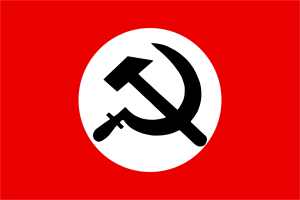No edit summary |
No edit summary |
||
| Line 1: | Line 1: | ||
[[File:National Bolshevik Party flag.svg.png|thumb|Flag of the [[National Bolshevik Party]]]] | [[File:National Bolshevik Party flag.svg.png|thumb|Flag of the [[National Bolshevik Party]]]] | ||
'''National Bolshevism''', often referred to as "'''NazBolism'''," | '''National Bolshevism''', often referred to as "'''NazBolism'''," was synthesized during the [[Interwar Period]] in [[Germany]] by political [[Philosophy|philosopher]] [[Karl Otto Paetel]] that rejected both the [[Communist Party of Germany]] (KDP) and the [[National Socialist German Workers' Party]] (Nazi Party) due to the former rejecting nationalism and the latter rejecting [[Communism]].<ref>[https://arplan.org/wp-content/uploads/2019/06/Paetel-The-National-Bolshevist-Manifesto-1933.pdf The National Bolshevist Manifesto]</ref> | ||
National Bolshevism reemerged to prominence in [[Russia]] in 1993 when [[Eduard Limonov]] and [[Aleksandr Dugin]] came together to found the [[National Bolshevik Party]] (NBP), embracing a Russian interpretation of the National Bolshevist movement.<ref>[https://web.archive.org/web/20080921193029/http://www.nazbol.ru/rubr28/index0/249.html Declaration on the establishment of the NBP]</ref> The NBP quickly became prominent during [[Black October]] when the Russian people rallied against [[Boris Yeltsin]] in an attempt to restore the Soviet Union (USSR). Since then, the tendency of National Bolshevism has seen a revival internationally inspired primarily by Dugin's work in the NBP and later the [[Eurasia Party]]. | National Bolshevism reemerged to prominence in [[Russia]] in 1993 when [[Eduard Limonov]] and [[Aleksandr Dugin]] came together to found the [[National Bolshevik Party]] (NBP), embracing a Russian interpretation of the National Bolshevist movement.<ref>[https://web.archive.org/web/20080921193029/http://www.nazbol.ru/rubr28/index0/249.html Declaration on the establishment of the NBP]</ref> The NBP quickly became prominent during [[Black October]] when the Russian people rallied against [[Boris Yeltsin]] in an attempt to restore the Soviet Union (USSR). Since then, the tendency of National Bolshevism has seen a revival internationally inspired primarily by Dugin's work in the NBP and later the [[Eurasia Party]]. | ||
Latest revision as of 23:45, 18 February 2023

National Bolshevism, often referred to as "NazBolism," was synthesized during the Interwar Period in Germany by political philosopher Karl Otto Paetel that rejected both the Communist Party of Germany (KDP) and the National Socialist German Workers' Party (Nazi Party) due to the former rejecting nationalism and the latter rejecting Communism.[1]
National Bolshevism reemerged to prominence in Russia in 1993 when Eduard Limonov and Aleksandr Dugin came together to found the National Bolshevik Party (NBP), embracing a Russian interpretation of the National Bolshevist movement.[2] The NBP quickly became prominent during Black October when the Russian people rallied against Boris Yeltsin in an attempt to restore the Soviet Union (USSR). Since then, the tendency of National Bolshevism has seen a revival internationally inspired primarily by Dugin's work in the NBP and later the Eurasia Party.